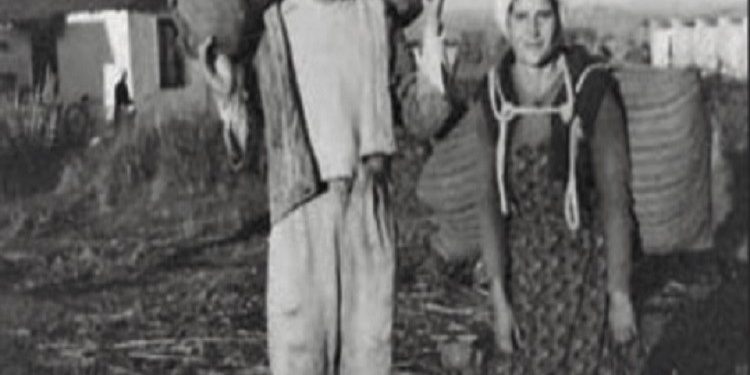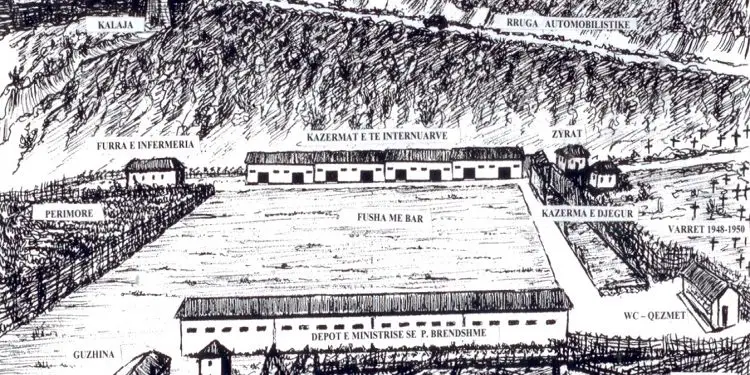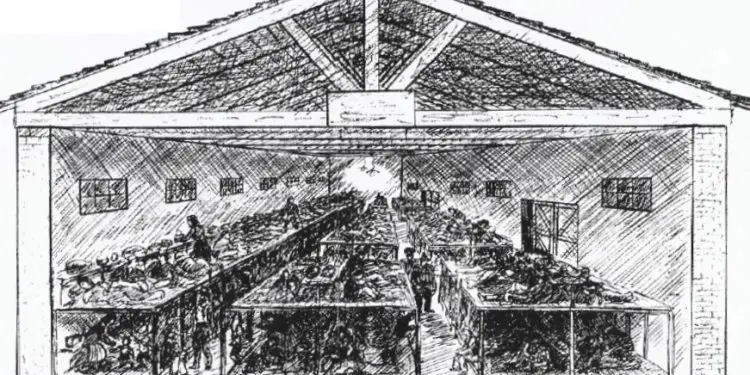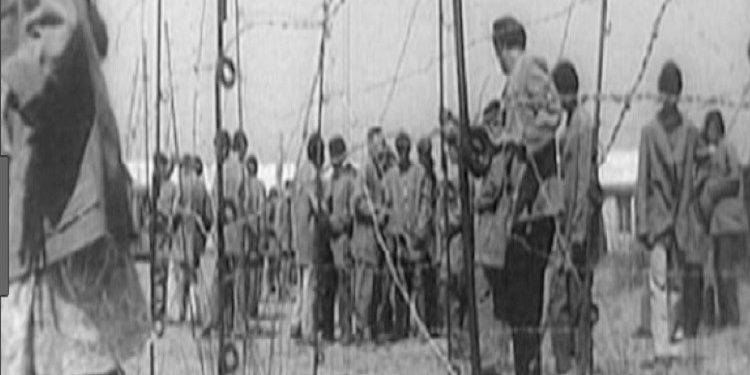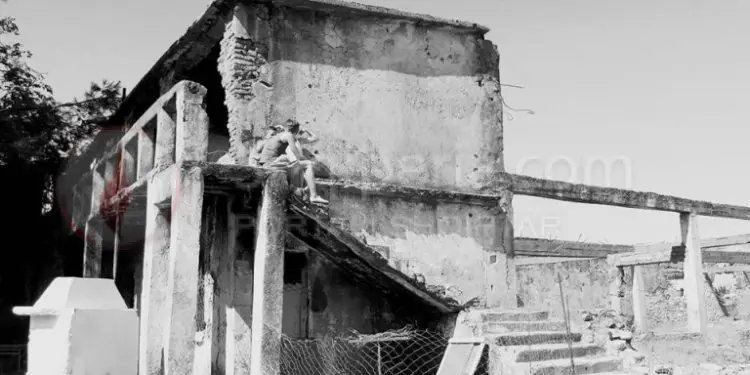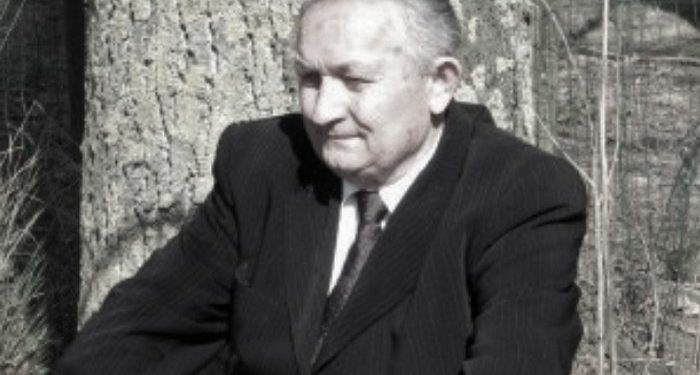By SHEFQET DOBRA
Part Two
Memorie.al/ People gathered like cattle, from all over the region, were gathered in four large barracks, in a former army unit, – in Bënçë of Tepelena, which they called: “the “internment” camp,” while in the letters we sent or received, it was known as an army unit, because the address was: Unit number (…) Tepelena. In fact, this was not an internment camp, nor an army unit; it was exactly a prison, because it was surrounded by barbed wire, guarded by armed guards, where they were counted every morning and evening, they went to work guarded by armed police. But not to know that there was a prison there, where there were: men and women, old and sick, infants and older children, who went to school, came and went, guarded by police. They shouldn’t have known that there was such a prison.
After adjusting the chords, his fingers began to move over the strings lightly and with the skill of a master. Its sweet sounds, although very low, in the silence that reigned, were felt by everyone. Everyone was listening to it with great pleasure, but they could not understand where it was coming from. Some thought that the only radio that was in the city center, must have been turned up too high, as it was barely audible even there.
Usually, that radio was turned up too high, only when a speech by a leading personality was being broadcast. In this hell, you could not think of such entertainment. The Bible says: “If the leadership has gone astray, the people are abandoned.” We were abandoned and forgotten. One after another, in silence, they began to approach. After a while, the nearby beds were filled up and down with people. No one disturbed the silence. Another took a tray and began to play, just enough to accompany the couple. A man got up from the bed, began to approach, making a sound with his mouth; “pum papapum, pum papapum”, according to the rhythm, and flapping his wings as if he were a huge bird. A warm atmosphere of joy and relaxation was created. This atmosphere lasted many years, many memories were awakened, which for us, had already been erased from memory, these people lived in dreams of the past, to forget the present. Many people were seen with tears in their eyes.
An old woman sighed deeply and let out a: “Oh life, oh life, how cruel you have been with us”! Two middle-aged men began to dance. That square that was created in the separation of the beds of the first and second row, towards the door, created the possibility of this entertainment. Someone grabbed a young man, about twenty, by the hand and said: – “Now, Moisi Cami will dance” – this was: the son of Ukë Cami and the grandson of Zenel Shehu. Moisiu was thin and tall. He started dancing, how beautifully he danced! His quick landings and rises, the twisting of his body, were amazing. Suddenly, with incomprehensible speed, Moisiu jumped onto the knees of Bam Brahimi, who was playing the çifteli, and with a somersault, he was in the middle of the square. Everyone cheered for this. When he started dancing the Dibrani double dance, another person grabbed his hand. His landing, standing on the tips of one foot, with the other leg stretched out in front, the trembling of his shoulders, gave him a special beauty.
Out of delight, one of the upper bunks said: “Long live Mojsi Cami, for you have taken away our day’s fatigue”! – apparently, the noise was heard outside, at the height of these fakirs’ joy, from the two doors of the barracks that were as big as cave entrances, the policemen, like savages, entered at once. They seemed to be prepared to face something that they themselves did not understand! They all had rubber batons in their hands. For a few moments, they stood there, finding an atmosphere completely different from what they had anticipated. It was a misfortune to ruin this joy that had taken possession of these tormented people, after all, what evil were they doing? They were enjoying it too. This atmosphere, it was forcing you to enjoy it together with them. The convicts had forgotten everything, this atmosphere had taken over their minds, and they did not notice the presence of the policemen at all.
Someone behind them shouted: “What are you doing, why aren’t you doing anything?” Lieutenant Hakiu was waiting in the office, which wanted a reason and found it. Suddenly the police were unleashed on them. One grabbed the çifteli and shot Bam Brahimi in the back, only the tail remained in his hand, the other threw the pan on the ground and kicked it with his feet, the spikes of their shoes created a noise that would set the date, the others, using rubber sticks, shot anyone who came in front of them, dragged anyone they could get their hands on. They had put Moisiu in the middle and shot him, saying; “You are the dancer, heh – heh, we will make you dance all night”! The screams of the police, the cries of women and children, were deafening. An old man said: “Don’t take men, what are you doing like this! “They didn’t do anything bad, bro!” The barracks was boiling with the screams of the police and the prayers of the suffering. The disfigured police dragged many men and boys away. The only joy and punishment, which is difficult to erase from our memory.
The barbarians and the victims screamed, some from pain, others from doing their duty. The women and children cried. They couldn’t just be called people, they were ignorant, soulless, and especially the one who had given the order. They kidnapped many people, put them in front of the command, and Hazis Alla, – the son of Isak Alla, – I cried all night for him, I had a cousin on my mother’s side, he was also the man who stayed next to me, who was never upset by my whims, even if I cursed him or threw stones at him! Finally, they gave the order to sleep. – “Not a word is heard”! – said the guard. The shoes of the policeman who was sitting inside made a rhythmic noise that seemed to hit something in the brain. And we couldn’t cry, because if the policeman heard us, he would use the whip. “Oh, my back, oh, my, what’s wrong with us”?! To get down from the upper beds, – when we got into trouble – instead of stairs, two small tacos were used, attached to the legs of the bed, these were very rare. To find them in the dark, you had to remember how many times you had to pass through their legs.
From the dead of night – the lights had been turned off – something was heard crashing on the cement and a weak groan; the policeman lit a match to look, and some convicts did the same, what could they see! An old man, very old, looking for the ladder, had fallen on the cement. It was Uncle Martin; he could hardly go down those stairs during the day, not at night. They had assigned him a place upstairs even though he had begged them a lot to stay downstairs. He was alone; his only daughter had been taken away with the others, now there was no one to take care of him! In order not to upset the others, every time he got up at night, he tried to find the stairs himself. He was not the first to fall into the cement, but this one remained the most unforgettable, because he had shown more than all the joy that evening; often, his low voice, was heard saying: “Good for you! You made us happy tonight! May you be happy all your life”. The next day, wrapped in his blanket, placed on two planks, six men escorted him to the Bënçës Bridge. All of us, especially the little ones and the old ones, lived hour by hour near death. Death was under our feet, wherever we lit fires, wherever we played, a hidden shell could explode anywhere, or we could even fall out of bed at night, like Uncle Martin!
In that cursed camp, there was work for the children too, those who went to school before the day, worked after the day, and after the day, they were taken out to work before the day; their job was to clean the stones when the land was being worked, in the fields around the camp – the auxiliary economy – and whoever did not do as much as was assigned, there was punishment for them too: with a dungeon or with a cut in their bread ration. One day, six of us, who were not satisfied with our work, were sentenced to a dungeon. It was very cold, we spent the whole night in a room without doors or windows, the construction of which had not yet been finished, there on the ground, and we fell asleep. The next day at lunch, they tied our hands behind our backs with wire, and Zef Miraka, with barbed wire, as the most disobedient, took us out – our relatives had called to bring us bread, we were told: – “Lie down”! Relatives – they said: – “Break the bread into pieces, throw money to each of them”! While we were pushing ourselves with the help of our feet to reach the pieces of bread, the policeman, Captain Tava – (it seems that was his last name) – was having fun by pushing away the bites with the stick he had in his hand, while the mothers on the other side of the fence were crying, when we crawled like snakes. It didn’t take long for him to come out, laughing – he said to the Captain – did you let them graze? While the Captain, he was shocked – the lieutenant without women in tears – said to the Captain – untie and let them go.
For these difficult conditions, the older ones thought of asking for mercy – because he asks for mercy, no matter who it is, they didn’t do anything wrong – but the mercy that these children would ask for, those who could put their hand in their heart and have mercy, this had to be thought of, it had to be made possible. One day when we were going to school, as soon as we reached the fortress, there was a small stop and suddenly, a call was heard, at first in a low voice, then it was followed by all the classes; – “Enver – Stalin, the pioneers want freedom”! The city was in an uproar like never before. Calling like this, we walked through the city to the school, which was on the top of the hill. When we left school in the morning, we went down calling like in the morning, in the afternoon, which also came to school, we met at the fortress, and together we made the Vjosa valley roar.
The camp command went wild, the lieutenant got angry: “Let these ragamuffins demonstrate, these barefoot, these enemy children”, etc.?! “Find out who organized them”! – ordered the lieutenant. He thought that someone from those who did not come to school had organized this, wanted to eat someone’s head. He stopped us, the plaintiffs, at the entrance of the camp, tried to find those who organized the demonstration, but in vain. He used all means. He beat and isolated some, but he could not find what he wanted. Every day, if we reached the corner of the castle, the shouting would start by itself. The lieutenant used the lowest vocabulary, against the children, but instead of the answer he wanted, he received only silence. There were times when he kept the morning students in front of the entrance of the camp, until the evening, without eating lunch and he never achieved his goal. Finally, he would tell them: “Get out, you rags”! True, our clothes were old, but not our souls! The silence of the children infuriated the lieutenant, and for this reason, he would do his best to silence them.
One Sunday, he held a meeting of the lieutenants. Everyone was there, workers and unemployed, students anyway. He let us wait until lunchtime in the field. When the lieutenant arrived with the captain, the marshal and two captains, he stood a little distance away and talked to them for a long time. We only watched the gestures he made with his hands. Finally, he approached, looked at us for a long time, “washing” the entire square of people with his eyes. He was completely furious; his body was crawling with anger. He took out the box, opened it by putting it between his fingers, the paper of the native between his thumb and index finger, he began to take out the tobacco from the box, the box was shaking in his hand – when he folded it in paper – he closed the box nervously, shook the cigarette and began to inhale. The smoke that came out of his mouth in flakes, made the smokers, who did not have it, saliva flow from their mouths. When the cigarette was half-finished, he asked: “Who can tell me, what children miss, who scream when they go to school? Eh? Speak! What do you want more? Who will speak”?
– Silence. Not even a fly was buzzing. Who dared! “What do you want, what do you lack?” he continued. “We take your children to school, so they can learn why they shout on the street? Eh! Hey, speak!” Only silence. – “You,” he addressed Bib Vokrri, “tell us what they want that they shout”?! – Bibë Vokrri, he was from Mirdita, he had two sons who had run away, one had been killed, his wife had died, this one was the first, and he was serving his sentence here. This trouble had often made him feel abnormal. When we children saw him alone, we would tease him, make fun of him, calling him crazy, but he didn’t hit us with a stick. Misfortune had overcome Biba, who stood up, leaning firmly on the stick he had, looked at all the people once as if confused, wiped his mustache with the palm of his hand, then turned to the commander and looked at him.
– “Speak, speak! Don’t be afraid, because no one dares to say anything”! – the lieutenant told him. – “We will see you as far as the mountains, oh my lord commander – said the old man, trembling with old age – as long as I have you, I have no breath! Let alone…, – he took a breath – which would join hands with an old man like me! Yes…, – he trailed off once, wiped his gray beard – …God has forgotten me, but you haven’t forgotten me, because you take care of me. I’ll take the bread and that dish, I don’t ask for anything else, I’m a sinner to cry”! – “Talk about what I asked you,” – said the lieutenant. – “Yes, what can I say, Mr. Commander? I don’t have children at school. I… muuu… I only have one thing left, Mr. Commander, that…- he continued once more – I am very old, sick, completely ruined,… I am counting my last days, and I hope that you, who have our fate in your hands, don’t remember me, release me, let me die in my village, that’s enough. Yes… since you asked me… you wanted my opinion…- the lieutenant looked at him angrily, when Biba dragged him on, without saying what he wanted. -… As far as I know, they don’t say anything bad, the two senior commanders, as far as I know, are begging, begging for mercy, to release them. Our children! The longing has taken its place. I don’t know,… I don’t know what else to say. They have a problem, like children and us old people. Who else, except the great Stalin and our commander, should we pray to?! We old people who don’t have children, who will hold our hand at night, we have this problem, we pray to the two commanders to put their hand on their heart because, it’s not for nothing that the commanders say, that a man becomes a child twice. They are mother and father and, more so for us, the commanders. And what can mother and father do, if they don’t want to? Praying is not a bad thing. It’s for us, let’s pray to our commander! I don’t know what else to say”!
– “I don’t know, huh? – said the lieutenant patiently – to tell Captain Selfos, may the commander make you a general, you know”?! – he was scolded. – “Father, I don’t say anything bad, by God, no. That’s how superiors are treated, Lieutenant, and you too, so to speak. Yes, if he has a grudge against the captain, if he doesn’t want to be a general, let him be a captain, or if I stay as he is, I won’t say no, no, let him stay that way”. – “Sit down”! – He said. At the height of his anger, he took out the box to smoke another cigarette. His hands were shaking from anger. He put the box in his pocket, lit the cigarette, spread the smoke, pushing it as if he wanted to cover the crowd with smoke. – “And you, Orhan, what are you going to tell us”? He turned to another old man. – Orhan Karamani, he was from Korça, his grandmother was in charge of the barracks, Qerimeja, and we considered him, like Biba, as children. He often shouted, cried and laughed, wandered around the fields, cursed without addressing anyone. He also often fought with his daughter. Both of them were the same as Biba.
– “What can I say, Commander? They are children…, little ones. They have longed for their homeland. They are begging our commander to release them! They are not saying anything bad, by God, no! If you have something in your hand, do something for them and for us elders! That’s all I have” – he said, and sat down. – “Who else wants to speak” – he said, no one listened. The lieutenant was even more enraged by these elders, he spoke and shouted, he threatened, saying: “I will take the perpetrators to prison”! The same sentences were repeated many times, several times, one dirtier than the other. When he got bored or tired, he turned his back and left, without giving the order to disperse. The crowd did not know what to do. Not even the policemen knew how to act. Finally, Policeman Hekurani – said: “Run”! – “Hey Bibe – a boy addressed him – does Selfua seem a bit like a captain, do you want him to become a general”?! – “Hey boy, he’s having fun; the lieutenant is a bit scared, lest Selfo really become a general. Where can we find him to become a general, but he, not even a marshal, is there! (The marshal was like the first captain) Ishalla and the lieutenant are going to be killed, because they run away and break their necks”! – He told Bibe. In the evening, after the newspaper was read, some students, those from the sixth and seventh grades, were called to the command. It continued on other nights and, every night, not everyone returned to the barracks. Some were sentenced to prison, some to having their bread rations cut, some students were told: “you are expelled forever, from all schools in Albania”. The lieutenant blew his whistle, but he didn’t defeat the “lekkamans”, he couldn’t find what he thought had stimulated this.
But what was the lieutenant’s hatred for these children, most of whom had been left without parents?! When I was in the village, after a few years, I went with the shepherds, I didn’t know the life of the shepherds, and their dogs were big, like wolves, because they would meet wolves. The dogs moved here and there, each guarding his own flock; I was heading towards a herd of sheep belonging to a villager, when I was laughing nearby, I heard the dog barking and rushed at me, I started running, a cousin called me: – “Sit down on the ground, or I will eat you,” but I was afraid that I was just running, I got tired and fell, the dog, – he was very close to me, – he could not stop running and, in order not to hurt me, he managed to overtake me without touching me, but when he jumped to the other side, he fell, he immediately got up and turned towards me. I was trembling with fear, while he sat on his tail next to me, looking at me and making a small noise, after a while, he raised one leg and with his soft paw, touched me several times, as if he were rubbing me, – while I was trembling because he was going to bite me, – then the dog got up, ran away wagging his tail.
These animals were so noble, if you asked them for mercy, they wouldn’t play with you, they would even pet me, to calm me down. What about our lieutenant? Had he grown up to be a bastard, who didn’t feel any pity for these hungry children, who were longing for their country and their parents, because if he had grown up with parents, brothers and sisters, there’s no way he would have been like that?! The lieutenant, not even as noble as that dog, had he?! Despite the lieutenant’s strict measures, the children every day, as soon as they entered the city, would start: “Enver – Stalin, the pioneers want freedom”. And this kind of demonstration continued until the lieutenant’s career came to an end. After the lieutenant left, taking on his “back” all the curses for the sins he had committed with these innocent sufferers, Haki’s place was taken by one of his subordinates, second lieutenant Ahmeti. This was the complete opposite of Hakiu, this one, even though he was a commander, had nobility, was peaceful, maybe he felt pain, but he had no opportunity, moreover. It didn’t take long, after Ahmeti was appointed commander, – maybe he made a request under the lieutenant, – that there was indeed a release of the pioneers, at least, of those who were without parents.
* * *
In two thousand and ten, when I was returning from Greece, with my son and my wife, I went to see the place where my childhood had gone. I saw those majestic barracks, whose roofs had fallen in. I went to the Bença Bridge, to see the graves of my childhood friends, but there were no graves there. An old man who was grazing some sheep, asked me: what are you looking at, boy? – “There were graves here, weren’t there?” – “Those of the internees”? – he said. – “Yes”! – I said. – “Oh boy, how could they leave those graves there”?! – he said. – “Why?” – I said. – “Because they were the evidence that showed that there had been an extermination prison here. When Enver was going to Gjirokastra once, he asked: “What are these graves here?” When they told him that they were from the camp. – “Those enemies, my friend? – he said. – When we return to Tirana, don’t look at them here anymore; you plow with a tractor! Our enemies – he said – our punishment will follow them, even after death”! “How could those graves remain, after the Almighty gave the order”?! – said the old man.
When we went organized in 2015, they allowed us to go inside, they had made a tombstone there, but instead of being at least a couple of meters long, so that it would be visible from the highway, because it represented a senseless massacre, it was small and, moreover, it was placed in a low place, as if they wanted to hide it from the eyes of travelers. Forgive me, my peers, for reminding you of that time after so many years. Memorie.al




